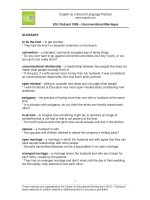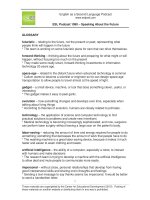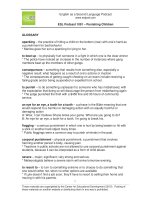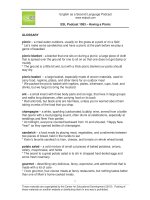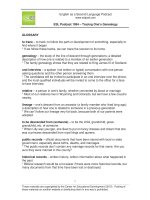ESLPod 1108 guide Want to be Fluent in English?
Bạn đang xem bản rút gọn của tài liệu. Xem và tải ngay bản đầy đủ của tài liệu tại đây (96.26 KB, 9 trang )
English as a Second Language Podcast
www.eslpod.com
ESL Podcast 1108 – Foreign Currency Exchange Rates
GLOSSARY
honeymoon – a vacation taken by a wife and husband immediately or very soon
after their wedding, intended to develop their romantic relationship and celebrate
their love for each other
* The day after the wedding, they’ll fly to the Bahamas for a one-week
honeymoon.
determination – a decision; an assessment; an evaluation
* The determination of the U.S. government’s Internal Revenue Service is final,
so there is no way to appeal its decisions.
favorable exchange rate – an indication that one’s own currency can buy a lot
of the currency of another country at a lower prices than usual, making it cheaper
for one to buy goods and services in that country
* The favorable exchange rate allowed them to dine in fine restaurants and go to
the theater often while on a trip back to their home country.
currency – the system of money used in a particular country, such as dollars,
pesos, francs, or yens
* How many countries use the euro as their currency?
currency market – the business exchange and the transactions of buying and
selling one currency to exchange it for another currency with the aim of making
money
* They’re saving their money in several different currencies to protect themselves
from fluctuations in the currency market.
falling – decreasing; becoming smaller or lower
* The shareholders aren’t pleased with the company’s falling sales.
to depreciate – to lessen in value or worth; to be worth less money; for
something’s value to decrease
* New cars depreciate quickly as soon as you drive them off the car sales lot.
strong – with a steady value or a value that decreases only very slowly, not
dramatically decreasing over time
* The neighborhoods around the best schools usually have strong home prices.
1
These materials are copyrighted by the Center for Educational Development (2015). Posting of
these materials on another website or distributing them in any way is prohibited.
English as a Second Language Podcast
www.eslpod.com
ESL Podcast 1108 – Foreign Currency Exchange Rates
bang for the buck – receiving a very good return on one’s expense or
investment; getting a lot in exchange for spending one’s money
* We get more bang for the buck by buying a 20-pound bag of rice rather than 20
one-pound bags.
at the whim of – based on the arbitrary, odd, or unpredictable idea of another
person or organization
* She flew to Philadelphia at the whim of her boyfriend, even though they had
been dating for only a few weeks.
Federal Reserve – the central bank of the United States, which regulates the
monetary system and has significant influence over finance and economics
* What factors does the Federal Reserve consider when setting interest rates?
central bank – a national bank of a country, responsible for printing money,
implementing monetary policies, and providing banking services for the
government
* If the central bank produces too much money, the country will experience
inflation.
financial – related to money; related to the management of a large amount of
money, especially for a company or government
* As a financial analyst, Cedric will be responsible for analyzing investment
opportunities.
romantic – related to feelings of love toward another person and the expression
of that love
* What’s so romantic about roses and a candlelight dinner?
overrated – said or believed to be bigger, better, more important, and more
significant than something actually is
* That restaurant was really overrated. The food wasn’t nearly as good as
everyone said.
solvent – able to cover one’s expenses and pay one’s debts; with cash or other
assets that exceed (are greater than) one’s liabilities (bills)
* Sales are growing, but our company won’t be solvent for another year or two.
sentimental – a person who is strongly influenced by feelings and values those
feelings over being practical
* Wynona is very sentimental, so she easily cries when she watches movies or
listens to sad songs.
2
These materials are copyrighted by the Center for Educational Development (2015). Posting of
these materials on another website or distributing them in any way is prohibited.
English as a Second Language Podcast
www.eslpod.com
ESL Podcast 1108 – Foreign Currency Exchange Rates
COMPREHENSION QUESTIONS
1.
a)
b)
c)
What does Isaac mean when he says, “We can get more bang for the buck.”
They’ll be able to go hunting.
They’ll be able to buy fireworks.
They’ll be able to get more for their money.
2.
a)
b)
c)
Which of these would be a romantic way of picking a honeymoon destination?
Considering which one has the most beautiful sunsets.
Considering which one has the most stable political conditions.
Considering which one has the best prices for travel packages.
______________
WHAT ELSE DOES IT MEAN?
falling
The word “falling,” in this podcast, means decreasing, or becoming smaller or
lower: “The availability of news and other content on the Internet has led to falling
sales of newspapers and magazines.” The phrase “to have a falling-out with
(someone)” means to have a bad or major argument with someone: “He had a
falling out with his father three years ago, and they haven’t spoken since then.”
The phrase “to fall flat on (one’s) face” means to not achieve the expected or
desired result in an embarrassing way: “The comic fell flat on his face. Nobody
laughed at any of his jokes.” Finally, the phrase “to be falling to pieces/bits”
means to be falling apart and to be in very bad condition: “That old house is
falling to pieces.”
strong
In this podcast, the word “strong” means with a steady value or a value that
decreases only very slowly, not dramatically decreasing over time: “When oil
prices are strong, gasoline is more expensive.” The phrase “to be in a strong
position” means to have some advantage in a negotiation and be likely to win:
“The buyers knew that the sellers were desperate to move, so they were in a
strong position when they made an offer on the house.” A person’s “strong point”
is his or her greatest strength: “Tina doesn’t have much experience as the other
job applicants, but her good communication skills are a strong point.” Finally, the
phrase “to be going strong” means to continue to be successful even after
someone or something is old and has been doing something for a long time: “The
company just turn 135 years old, and it’s still going strong.”
3
These materials are copyrighted by the Center for Educational Development (2015). Posting of
these materials on another website or distributing them in any way is prohibited.
English as a Second Language Podcast
www.eslpod.com
ESL Podcast 1108 – Foreign Currency Exchange Rates
CULTURE NOTE
The FDIC
The “Federal Deposit Insurance Corporation” (“FDIC”) is a U.S. government
“corporation” (business) that “insures” (provides financial protection for)
individuals’ “deposits” (the amount of money that one has put into an account) in
bank accounts. Banks that are members of the FDIC can say that their
customers’ accounts are insured for up to $250,000. “In other words” (to explain
things in another way), an individual can “rest assured” (not worry), knowing that
he or she will always have access to his or her deposits of up to $250,000—even
if the bank “goes under” (goes out of business and closes)—because the FDIC
will “repay” (pay back) any lost money.
Banks that are members of the FDIC have signs with the following words:
Deposits are “backed” (insured) by the full “faith and credit” (a
phrase describing a government’s full commitment to doing
something) of the United States Government.
In addition to insuring deposits, the FDIC also works closely with its member
banks. The FDIC “examines” (inspects) banks to make sure they are following all
the rules and managing money in “prudent” (responsible, conservative, and safe)
ways while considering “consumer protection” (efforts to give customers
reassurance, power, and safety when interacting with large businesses).
The FDIC was created by the Banking Act of 1933. It operates on funds or
money received from member banks and from the “proceeds” (money received)
from its investments, but it does not receive any money from the U.S.
government. “To date” (so far), it has always “met its obligations” (been able to
“cover” (pay for) deposits) when banks have “failed” (gone out of business).
______________
Comprehension Questions Correct Answers: 1 – c; 2 – a
4
These materials are copyrighted by the Center for Educational Development (2015). Posting of
these materials on another website or distributing them in any way is prohibited.
English as a Second Language Podcast
www.eslpod.com
ESL Podcast 1108 – Foreign Currency Exchange Rates
COMPLETE TRANSCRIPT
Welcome to English as a Second Language Podcast number 1,108 – Foreign
Currency Exchange Rates.
This is English as a Second Language Podcast episode 1,108. I’m your host, Dr.
Jeff McQuillan, coming to you from the Center for Educational Development in
beautiful Los Angeles, California.
Visit our website at ESLPod.com. Become a member of ESL Podcast, or take a
look at some of our ESL Podcast Courses which you can buy and download the
very same day – nothing to wait for.
On this episode, we have a dialogue between Sydney and Isaac about
exchanging money when you travel. Let’s get started.
[start of dialogue]
Sydney: Where should we go on our honeymoon? I thought Rome would be nice.
Isaac: Let me check. No, that wouldn’t be a good idea.
Sydney: Okay, how about Tokyo? I’ve always wanted to visit Japan.
Isaac: No, I’m afraid not.
Sydney: How are you making these determinations?
Isaac: I’m checking to see if the U.S. dollar has a favorable exchange rate with
those currencies. We want our dollars to go as far as they can.
Sydney: You mean you want to pick our honeymoon destination according to the
currency market.
Isaac: I’m just saying that we should take advantage of falling currencies or ones
that have already depreciated significantly. A strong dollar means we can get
more bang for the buck.
Sydney: So you’re saying that you want us to make plans at the whim of the
Federal Reserve and central banks.
5
These materials are copyrighted by the Center for Educational Development (2015). Posting of
these materials on another website or distributing them in any way is prohibited.
English as a Second Language Podcast
www.eslpod.com
ESL Podcast 1108 – Foreign Currency Exchange Rates
Isaac: Well, I wouldn’t go that far. I’m only saying that it would make financial
sense.
Sydney: That doesn’t seem like a very romantic way of picking a honeymoon
destination.
Isaac: Romance is overrated. Wouldn’t you rather be solvent than sentimental?
Sydney: I’d rather be solvent and sentimental.
[end of dialogue]
Sydney asks Isaac, “Where should we go on our honeymoon?” Your
“honeymoon” (honeymoon) is the vacation you take after you get married.
Usually, but not always, it’s immediately after the wedding. Sometimes people
take their honeymoon later. The honeymoon is supposed to be, of course, a
wonderful time for the married couple, and often the last wonderful time they
have. I’m just kidding, of course. Marriage has happiness beyond the
honeymoon. It often lasts another month or two.
Sydney suggests they go to Rome – Rome, Italy, of course. Isaac says, “Let me
check” – let me investigate. “No,” he says, “that wouldn’t be a good idea.” Now,
we’re not sure what Isaac is checking when he says, “Let me check.” We’re not
sure what he’s investigating in order to say yes or no. Sydney then gives him
another suggestion. She says, “Okay, how about Tokyo?” – Tokyo, Japan, of
course. “I’ve always wanted to visit Japan,” she says. Isaac says, “No, I’m afraid
not.” “I’m afraid not” is just another way of saying no. It’s a little more polite.
Sydney then says, “How are you making these determinations?” which is, of
course, a very good question. A “determination” is a decision or an assessment –
how you decide one way or another. Isaac says, “I’m checking to see if the U.S.
dollar has a favorable exchange rate with those currencies.” So, Isaac is making
this determination based upon the exchange rate. The “exchange rate” is
basically the amount of money that you get when you, in effect, buy another
country’s money, another country’s currency.
“Currency” (currency) refers to the system the money that is used in a particular
country. In the United States, we use dollars. But if I’m going to go to Europe, I
would in many countries need to exchange my dollars for euros. I would need,
basically, to buy euros. A “favorable exchange rate” is when you can get a lot of
money in the other country for the money in your country. So, a favorable
6
These materials are copyrighted by the Center for Educational Development (2015). Posting of
these materials on another website or distributing them in any way is prohibited.
English as a Second Language Podcast
www.eslpod.com
ESL Podcast 1108 – Foreign Currency Exchange Rates
exchange rate between say the U.S. dollar and the euro would mean that I could
get a lot of euros for my dollar. And as we record this in 2015, that is true.
Isaac, then, is making his decision about where he and Sydney should go on
their honeymoon by looking at the exchange rates. He says, “We want our
dollars to go as far as they can,” meaning we want to get as much for our money
as possible. Sydney is not very happy when she learns this. She says, “You
mean you want to pick our honeymoon destination according to the currency
market.”
Sydney is saying that Isaac wants to “pick” (pick), or select, the honeymoon
location based on the currency market – the price of different currencies. A
“market” is usually a word we use to describe the system or the mechanism for
people to buy and sell things. So, the “currency market” would be buying and
selling of currencies, of different kinds of money. Isaac says, “I’m just saying that
we should take advantage of falling currencies or ones that have depreciated
significantly.”
For a currency to “fall” means that it has become less expensive or less valuable.
“Falling” here refers to decreasing – becoming smaller or lower. We could talk
about the stock market falling. That would mean that the price of stocks was
going down. Isaac thinks that they should select their honeymoon location based
on the state of the currency in that country. He also mentions “depreciated
currencies.” The verb “to depreciate” (depreciate) means to lessen in value or
worth, to be worth less money – at least that’s what Isaac means here.
He says, “A strong dollar means we can get more bang for the buck.” A “strong
dollar” would be a dollar that keeps its value, that is expensive relative to other
currencies. The phrase “bang (bang) for the buck (buck)” refers to getting a lot for
your money. “Buck” refers to money here, American money. We refer to one
dollar as a “buck.” “To get a lot of bang for your buck” means to get a lot for your
money, to get a very good value. Sydney says, “So, you’re saying that you want
us to make plans at the whim of the Federal Reserve and central banks.”
The expression “at the whim (whim) of” means based on some rather
unpredictable idea of another person or organization. We have a related
expression, “on a whim,” which means to do something without thinking about it
closely or carefully. So to be “at the whim of” someone means that your future –
things that are important to you – depend on someone else’s decision, someone
else who may not make a decision very rationally or might make a decision
arbitrarily – without any good reason for it.
7
These materials are copyrighted by the Center for Educational Development (2015). Posting of
these materials on another website or distributing them in any way is prohibited.
English as a Second Language Podcast
www.eslpod.com
ESL Podcast 1108 – Foreign Currency Exchange Rates
Sydney is saying that their plans depend on the decisions of the Federal Reserve
and the central banks. The “Federal Reserve” is the national bank of the United
States. A “central bank” of a country – or in the case of the European Union, of
the E.U. – is the bank that helps determine and regulate the monetary system for
that country or that area or region. The central bank typically decides how much
money it’s going to print. Here in the U.S. that would mean how many dollars will
be available in the economy.
Isaac disagrees with Sidney’s description of his approach to planning their
honeymoon. He says. “Well, I wouldn’t go that far,” meaning that’s partially true,
but not as much as you are saying. He says, “I’m only saying that it would make
financial sense” – it would make economic sense for the two of them. Sydney,
however, says, “That doesn’t seem like a very romantic way to pick a honeymoon
destination.” Something that is “romantic” (romantic) is something related to
feelings of love toward another person – an expression of that love.
Then Isaac says something very stupid, very foolish. He says, “Romance is
overrated.” To say something is “overrated” (overrated) means that people think
it’s more important than it really is, more significant than it actually is. You would
never want to say that to your girlfriend, wife, or in this case, fiancé – the woman
who is going to marry you. Isaac says, “Wouldn’t you rather be solvent than
sentimental?”
“To be solvent” (solvent) means that you have enough money to pay for your
expenses. You have enough money to live on. You have enough money to pay
your bills. “Sentimental” (sentimental) refers to a person who is strongly
influenced by feelings and perhaps is basing their decisions more on feelings
than on reason, than on intellect. Isaac says, “Wouldn’t you rather be solvent
than sentimental?”
He’s saying that there is this choice: either you can be solvent – either you can
spend money wisely – or you can be sentimental; you can be guided by your
feelings. Sydney doesn’t think you have to choose between these two options.
She says, “I’d rather be solvent and sentimental,” which I think is true, of course.
You can pay your bills and still follow your heart. Now that’s romantic.
Now let’s listen to the dialogue, this time at a normal speed.
[start of dialogue]
Sydney: Where should we go on our honeymoon? I thought Rome would be nice.
8
These materials are copyrighted by the Center for Educational Development (2015). Posting of
these materials on another website or distributing them in any way is prohibited.
English as a Second Language Podcast
www.eslpod.com
ESL Podcast 1108 – Foreign Currency Exchange Rates
Isaac: Let me check. No, that wouldn’t be a good idea.
Sydney: Okay, how about Tokyo? I’ve always wanted to visit Japan.
Isaac: No, I’m afraid not.
Sydney: How are you making these determinations?
Isaac: I’m checking to see if the U.S. dollar has a favorable exchange rate with
those currencies. We want our dollars to go as far as they can.
Sydney: You mean you want to pick our honeymoon destination according to the
currency market.
Isaac: I’m just saying that we should take advantage of falling currencies or ones
that have already depreciated significantly. A strong dollar means we can get
more bang for the buck.
Sydney: So you’re saying that you want us to make plans at the whim of the
Federal Reserve and central banks.
Isaac: Well, I wouldn’t go that far. I’m only saying that it would make financial
sense.
Sydney: That doesn’t seem like a very romantic way of picking a honeymoon
destination.
Isaac: Romance is overrated. Wouldn’t you rather be solvent than sentimental?
Sydney: I’d rather be solvent and sentimental.
[end of dialogue]
There’s nothing overrated about our wonderful scripts written by our wonderful
scriptwriter. Thank you, Dr. Lucy Tse.
From Los Angeles, California, I’m Jeff McQuillan. Thank you for listening. Come
back and listen to us again right here on ESL Podcast.
English as a Second Language Podcast was written and produced by Dr. Lucy
Tse, hosted by Dr. Jeff McQuillan. Copyright 2015 by the Center for Educational
Development.
9
These materials are copyrighted by the Center for Educational Development (2015). Posting of
these materials on another website or distributing them in any way is prohibited.
